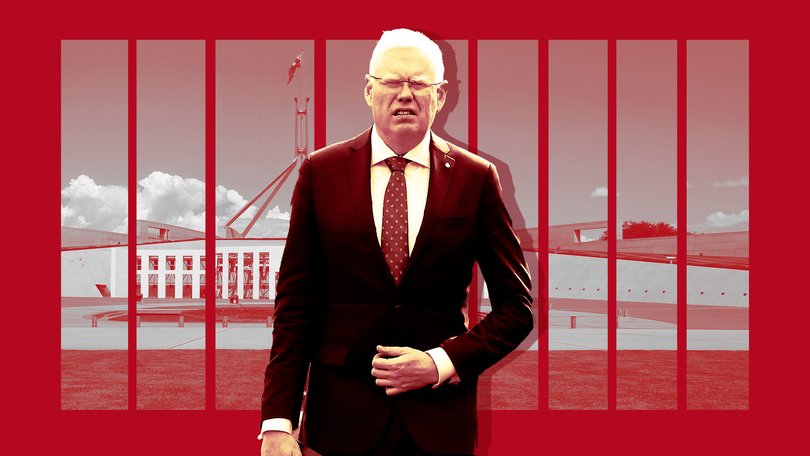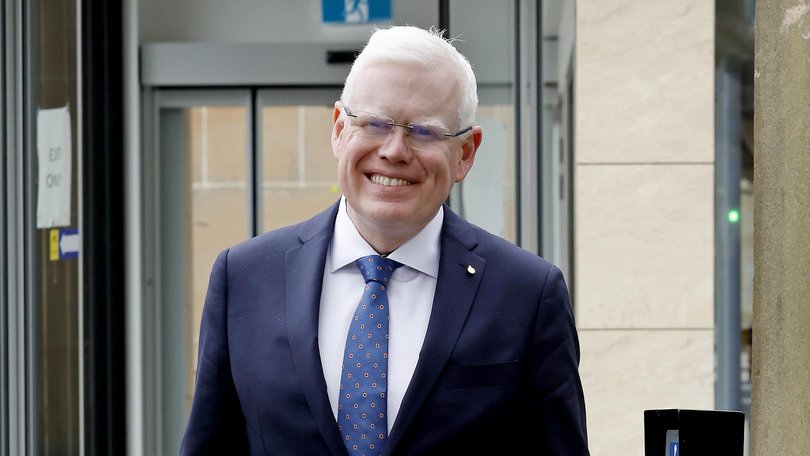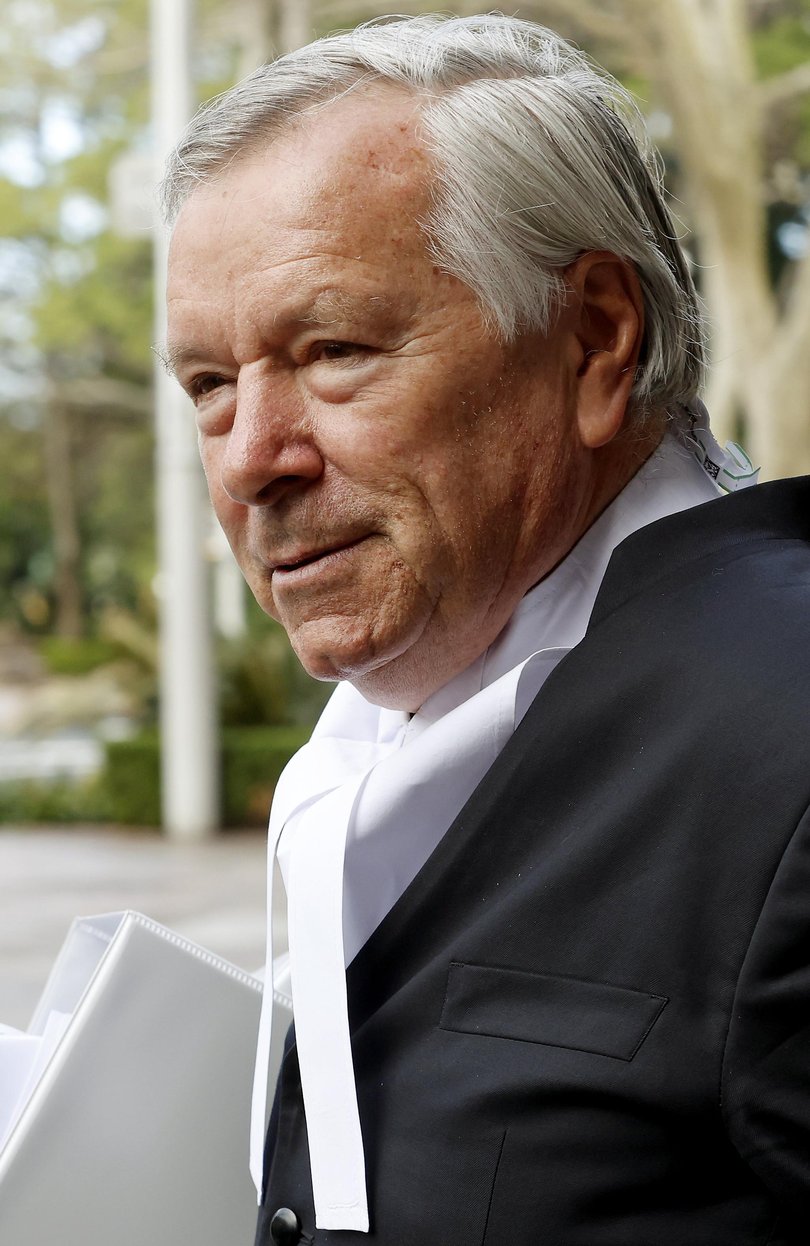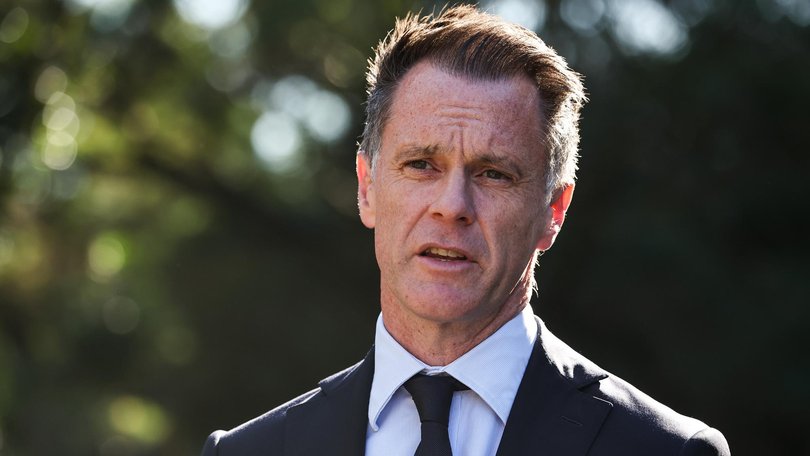Expulsion of Kiama MP Gareth Ward from NSW Parliament to go ahead after court ruling
A court has handed down its judgment in disgraced MP and convicted rapist Gareth Ward’s last-minute legal bid to keep his job.

A motion to expel disgraced NSW MP and convicted rapist Gareth Ward will go ahead after a last-minute legal challenge.
Ward challenged the Legislative Assembly’s ability to put forward the motion at a full-day hearing before the Court of Appeal on Thursday.
In his judgment, Chief Justice Andrew Bell said each of the claims made by Ward’s lawyer was “rejected”.
Sign up to The Nightly's newsletters.
Get the first look at the digital newspaper, curated daily stories and breaking headlines delivered to your inbox.
By continuing you agree to our Terms and Privacy Policy.“There was no evidence to support the assertion that a resolution to expel the plaintiff (Ward) would be punitive in scope and effect, and invalid for that reason,” he said.
“Whether or not the (Legislative) Assembly was under an obligation to afford Mr Ward of procedural fairness, he has been afforded an opportunity to present arguments as to why he should not be expelled.
Justice Bell said the “electorate of Kiama would be re-enfranchised by the holding of the by election”.
He ordered that the interim injunction be dismissed.
Ward was also ordered to pay the costs of the defendant, leader of the house Ron Hoenig.
In a statement, Liberal leader Mark Speakman said the Opposition was “ready to have Gareth Ward expelled from parliament forthwith”.
The Kiama MP was taken into custody on remand last week while awaiting sentencing after he was found guilty by a jury of three counts of indecent assault and a fourth count of intercourse without consent.
The charges relate to acts against two young men – an 18-year-old at Meroo Meadow in 2013 and a 24-year-old man in Potts Point in 2015 – and sparked calls for the south coast MP to resign from parliament.
A motion was expected to be introduced by Labor to the Legislative Assembly to expel Ward, with support from the Coalition, earlier this week. If successful, it would mark the first expulsion from the NSW lower house since 1917.
Instead, the matter was set down for a full-day hearing at the Court of Appeal after an 11th-hour injunction was applied for by Ward’s lawyers, who argue the state parliament does not have the power to expel him.

Kicking off shortly after 9.30am, Ward’s lawyer, Peter King, said the motion to expel the Kiama MP was “punitive”, and the Legislative Assembly had no power to expel him.
“We submit it is punitive, firstly because it expels the plaintiff (Ward) from his seat to which he was elected by the people of Kiama,” Mr King told the Court of Criminal Appeal.
Mr King said the action was punitive also because it would also trigger a by-election, and Ward would “further be punished in that respect by losing the opportunity of regaining his seat.”
As a result of being in custody, Ward was “thereby punished by being excluded from the Assembly and his inability to attend the very sitting of parliament”, Mr King told the court.
He would also be unable to vote on the expulsion motion.
“In short, he is to be expelled by a kangaroo court,” Mr King said.
Mr King is calling on the court to halt the potential expulsion motion until after Ward is sentenced next month, and until after he has had the opportunity to appeal — which could take years.
He claimed expulsion would “usurp” his sentencing.
Chief Justice Andrew Bell replied: “It doesn’t. The government can’t send Mr Ward to prison.”
In response, Mr King said: “If Mr Ward is expelled, excluded from standing for office, suffers the other penalties and want for due process, that’s all in advance of the court properly acting, it’s interfering, usurping to that extent, I’m not suggesting entirely, in that process.
“What we are saying is defer, just wait until the judge deals with this matter.
“Just wait until the Court of Criminal Appeal deals with this matter.”
Four-page letter key to Ward’s case
At the centre of Mr King’s argument is a letter to Ward’s solicitor.
The four-paragraph letter from leader of the House Ron Hoenig, outlining his intention to introduce the motion, failed to identify the specific “behaviour to be relied upon” to expel Ward, Mr King said.

The claim triggered a back-and-forth between Mr King and the three justices, who repeatedly asked Mr King whether “serious criminal offences”, as noted in the letter, were not “unruly conduct”.
“Part of the problem is you are not answering my questions, which are very clear: Are you submitting or are you not that convictions of serious criminal offences is unworthy conduct within the meaning of the standing orders?” Chief Justice Andrew Bell asked.
“Without more, the answer is no because it is not evidence of the facts underlying the judgment. There is no particulars or fair notice to the MP as to what the case is against him,” Mr King replied.
Mr King was again questioned by Chief Justice Bell over claims the House was “determined to punish” (Ward).
“Using its numbers, using the opposition which has freely coalesced with the government on this, as a result of which Mr Ward’s seat comes up and the government moves from being in a minority to being equality … very much a political game,” Mr King said.
Chief Justice Bell asked Mr King in reply whether he was introducing a “motion of improper purpose”.
”Because if you are, there are real issues if you should be permitted to,” he said, claiming Mr King used “loose language”.

In response, Mr King refuted the comments were made “on the run” and said Ward would lose the ability for redress if he was expelled but won his appeal in court.
Mr King claimed the government was “jumping in early” before Ward was sentenced, which is set down for next month, and before he has had the opportunity to appeal his convictions.
Under Standing Order 254 of the NSW parliament, an MP only faces expulsion if they are found by the House to be “guilty of conduct unworthy of a member of parliament”.
Much of the government’s case turns on the authority it has to expel Ward.
Its lawyer, Craig Lenehan SC, said Ward had “assumed the burden of showing some sort of punitive purpose” in launching the case.
“The letter, we say, is very errored territory … it displays no punitive purpose whatsoever and cannot be said to involve some sort of sham,” he said.
“We would say … it’s obviously open to a legislative body to form a view that a member committed by a jury of serious sex offence should be expelled to in order to protect the mutual trust and confidence of its members, and also the confidence of the community in the ability of the assembly to discharge its high constitutional functions.
“The self-proactive purpose is so strong that it would be very difficult to establish some sort of illicit punitive purpose.”
Mr Lenehan denied the expulsion would affect sentencing and argued for the interlocutory order granted on Monday to be removed.
The court was told Ward’s lawyers did not contact their opponents that they were approaching a duty judge for the order.
The matter will return at 5pm.
Last-minute legal manoeuvre
The last-minute legal move makes it almost impossible to expel Ward, who is still being paid by parliament, before the Legislative Assembly adjourns until next month.

Mr Hoenig earlier in the week said the court did not have the authority to stop matters being put before legislators, but the state government would abide by the injunction out of respect.
The matter sets the stage for a peculiar legal challenge.
Premier Chris Minns told 2GB on Tuesday morning most people would “appreciate it’s an unconscionable situation to have someone who’s currently sitting in jail in Silverwater convicted of serious sexual offences who is demanding to remain a member of parliament and continue to be paid”.
Asked why Ward had not resigned, Mr Minns said “clearly, he’s got no shame”.
Opposition Leader Mark Speakman said if the government was prepared to do so, the lower house could resume debate on the motion before September’s next sitting of parliament with a smaller group of MPs.
“We would be willing to do that. It would be possible, for example, to have just 20 MPs, the quorum, deal with the matter,” he said.
Mr Speakman said “as a general principle, we are supporting the government’s efforts in court”.
“That includes as a general principle the arguments that it’s putting in court and the outcome that it seeks, which is that the injunction is lifted and the parliament can proceed to expel Mr Ward.”
The injunctive orders issued by the court, “pending further order”, restrain the defendant, Mr Hoenig, from “from taking any steps to expel or otherwise resolve to expel” Ward between July 30 and 10am on Friday.
Originally published as Expulsion of Kiama MP Gareth Ward from NSW Parliament to go ahead after court ruling
